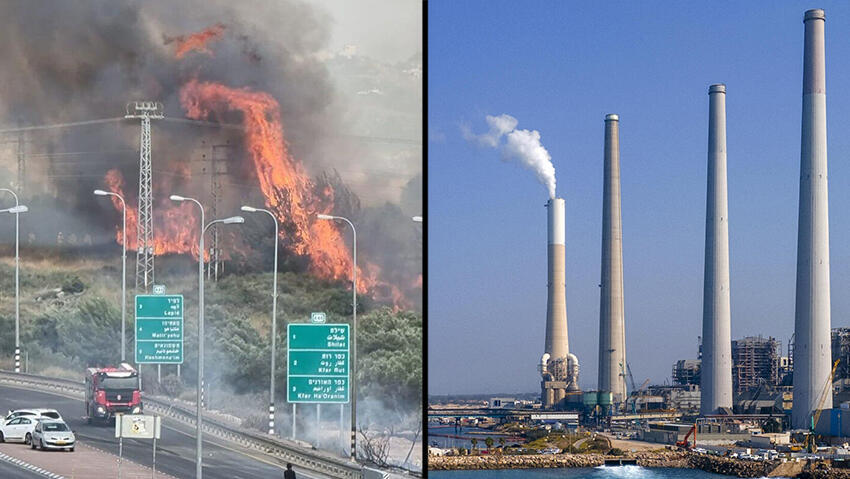Dr. Ami Givati says extreme heatwaves will become a common occurrence in the coming years, warns Israel must prepare accordingly; ‘We see that it’s always underestimated and always worsens’
Alexandra Lukash|07.13.23
Israel was struck by a heavy heatwave on Thursday, lasting until mid-next week and while prolonged heatwaves have been rare in Israel until now, climate experts anticipate that in the coming years, they will become a regular occurrence.
Intense heat loads will be felt across the country, with temperatures soaring up to 45℃ (113℉) in the Jordan Valley. Coastal and lowland areas will experience extremely high humidity levels.
In an interview with Ynet, Dr. Ami Givati, a hydrologist and climate expert, addressed the current heat wave and what we can expect in the coming years.
“Heatwaves occur every summer, but the real deviation is perhaps the duration that we feel it,” he said, referring to the current heatwave. “Maybe we won’t break records or reach temperatures above 45℃, as initially anticipated. However, the duration – starting today and lasting nearly a week – is abnormal. Typically, summer heatwaves are short-lived, but this time it will be long.”
He also discussed the impact of greenhouse gas emissions and the climate crisis on extreme climate events like heat waves. “Almost certainly, it will continue and last. It’s difficult to predict how many days. While heatwaves were once short and rare, now their frequency is increasing, and their duration is extending,” Dr. Givati said.
“In the United States, they are currently experiencing heatwaves lasting three weeks. This was unheard of before. In Texas, the power grid was damaged. On the other side of the globe in India, we hear about devastating floods. We are witnessing an escalation. A week-long heatwave is likely becoming the new standard.”
Dr. Givati stated that days like those at the beginning of the week, when the weather was relatively comfortable for summer months, will become rarer in the near future. “There will hardly be any days of relief, like the past few days with clouds and drizzles,” he said.
“It’s going to be a prolonged heatwave. Toward the end of the century, it will be very frightening. Some projections indicate temperatures 3-5℃ (6-10℉) higher than the current average – the normal summer weather will be close to 40℃ (104℉). It’s an extreme scenario. It’s quite alarming.”
The climate expert mentioned last year’s heatwave in Europe, which caused numerous fatalities. “Europe experienced its most extreme heatwave ever in 2022,” he said. “Official reports speak of around 66,000 fatalities. These are vulnerable populations. Sometimes it occurs without us realizing it – there are populations affected by heatwaves.”
Dr. Givati calls to prepare for long and extreme heatwaves, which are expected to hit in the coming years. “If by 2026 we are not ready for these extreme heatwaves in terms of energy and agriculture, we will experience power outages. I sincerely hope that those responsible for the systems prepare for these forecasts and take safety measures. We see that it’s always underestimated and always worsens. Europe did not do this, and in Europe, they define it as a catastrophe,” he said.
Due to the anticipated heatwave, the Nature and Parks Authority announced a complete ban on lighting fires in all nature reserves and national parks due to the risk of wildfires, starting Thursday and until Sunday. The Jewish National Fund also announced a ban on lighting fires in all forests, at least until Sunday.
Heatwaves pose growing threat amid Israeli govt. inaction – YNET
Experts point to red flags, State Comptroller publishes an alarming report, yet Israel’s progress in the field is somewhere ‘between lagging and zero’ with no real national response at hand
Ilana Curiel, Yaron Drukman|07.13.23
The frequency of heatwaves, like the one that began on Thursday, combined with the government’s lack of preparation, is transitioning from inconvenience into a matter of life and death, according to experts. A study by the Ministry of Environmental Protection has, for the first time, pointed to the link between heatwaves and climate crisis-related mortality in Israel.
Each heatwave in Israel is responsible for over 45 deaths on average. It is estimated that heat waves will become more frequent and intense in the coming years due to the climate crisis, and the most vulnerable members of society are expected to be the ones to pay the price – sometimes as costly as their very lives. The power grid is at risk of collapsing due to high demand, and the severity of the situation should concern decision-makers who simply cannot manage to come up with a detailed strategic plan to address the problem.
In fact, we have all been experiencing the repercussions of the climate crisis in recent years, and most of us are well aware of the additional risks we may suffer in the coming years. Israel’s State Comptroller wrote in his report that climate change has four main effects: rising temperatures, reduced precipitation, rising sea levels, and increased frequency of extreme weather events. These interconnected trends reinforce each other, with each one having a great impact on humans and nature, as well as a large potential for destructive consequences.
The State Comptroller’s alarming report on climate crisis management
In October 2021, less than two years ago, State Comptroller Matanyahu Englman published a scathing report on the preparation strategy for the climate crisis. The bottom line in the report was that “Israel is not prepared for the climate crisis.” In an interview with Ynet and “Yediot Ahronot” last month, Englman said that Israel’s progress in the field is somewhere “between lagging and zero.”
n comments attached to the report, the comptroller warned that “Israel is one of the few countries in the world that still does not operate on the basis of an organized and approved national preparation plan, despite being located in a high-risk region, and is therefore even more exposed to the risks of climate change. This data is a warning sign.”
In the report, Englman examined, among other things, preparation – or more accurately, lack thereof – for the climate crisis. He wrote that since the government’s “Decision no. 079 – Israel’s Preparedness to Adapt to Climate Change” was made years ago, there was still no comprehensive national action plan that is being implemented, so the objective of this government decision, which states that “Israel will be prepared for the impacts of a changing climate,” has not been achieved.
Regarding preparedness, Englman wrote that despite the need for preparation and long-term preventive actions for risks in areas that may be affected by climate change (including health, agriculture and food, water resources and energy, infrastructure, planning, local authorities, emergency readiness, national security, and biodiversity), according to a survey, 82% of 63 public bodies in Israel did not address the issue within an organizational risk management process, and 77% did not conduct risk mapping or assess the impacts of climate change on their operations.
The Climate Crisis and the Insufficient Action
Professor Adi Wolfson – an environmental activist and researcher at the Samuel Neaman Institute for National Policy Research, who writes about the climate crisis for Ynet – explained why heatwaves like the one currently prevailing in Israel will become more frequent. “Due to Israel’s geographical location, the climate crisis is expected to impose more extreme consequences on Israel. Despite this, Israel, which repeatedly fails to set significant targets for carbon emission reduction and to implement existing goals, is also not prepared to adapt to climate change in general and heatwaves in particular.”
Professor Wolfson emphasized that heatwaves affect welfare and life itself, “They impact the health of each one of us, both short and long term, from dehydration and heatstroke to heart, blood, and kidney diseases, and especially influence vulnerable populations such as chronically ill and senior citizens. They also affect weak populations, from homeless people to impoverished families, who cannot always stay in shaded or air-conditioned places. They affect those working outdoors as well as animals and plant life,” Wolfson said.
“Heatwaves can also damage vital infrastructure, from problems with cooling power stations and electricity supply, to livestock heat stress, road and railway deformations, pipe ruptures, and disruptions to communication systems,” he continued. “Accordingly, they can also affect the provision of essential services such as healthcare and transportation.”

(Photo: AP, Yiftach Cohen)
According to Professor Wolfson, “Adapting to heatwaves requires preparedness from all government ministries and local and national authorities.” He said that the government’s response should include “the establishment of cooling shelters for those in need due to economic difficulties or power outages, and advance preparation for forest fires. It should address the impacts on daily activities, such as summer camps or sports and cultural events. But specifically in Israel, where emergency situations, in the case of heatwaves, become a real and significant threat, there is still no well-organized ‘doctrine of preparedness,’ and we rely on the cultural codes of ‘it will be okay.'”
Impact on Agriculture
So, what could be the implications of heatwaves, like the one we are experiencing these days? Heatwaves threaten our food security, and the impact on agriculture is almost certain. According to data from KANAT, the Insurance fund for natural risks in agriculture, an extreme heatwave that occurred in May 2020 caused damages of 30 million Shekels to farmers. Orchards and vegetable fields were subject to the most damage.

(Photo: Asaf Shamir, KANAT)
Impact on the Military and Infrastructure
Heatwaves also affect us from a security perspective. Prolonged waves have an impact on the readiness of different IDF military units. If temperatures continue to rise over the years, as experts predict, it may also affect the operational capabilities of the Air Force.

(Photo: JACK GUEZ / AFP)
Civil infrastructure is also at risk of collapse. Last June, on a Friday when hundreds of thousands of Israeli households, were cut off from electricity, desalination plants were also affected and were shut down for hours. This goes to show how vulnerable the Israeli infrastructure is.
